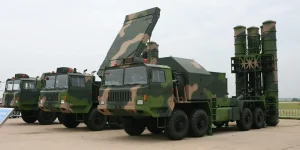- Views: 2K
- Replies: 5
India's air defence capabilities were significantly tested as it reportedly downed multiple Pakistani aircraft, including an F-16 fighter jet, two JF-17 combat aircraft, and a critical Airborne Warning and Control System (AWACS) plane, according to government sources.
These actions followed a series of aggressive manoeuvres initiated by Pakistan across various locations in Jammu and Punjab.
Sources within the government stated that the Pakistani F-16 and two JF-17s, which are multi-role combat aircraft, were intercepted and neutralised by Indian air defence systems after Islamabad launched incursions.
Further reports indicated that a Pakistani AWACS aircraft, vital for airborne surveillance and command, was also shot down. It is believed this aircraft fell within Pakistan's Punjab province. The AWACS system provides crucial long-range radar capabilities, making its loss significant.
In addition to these aerial engagements, Indian forces successfully thwarted several drone-based attacks. Attempted drone infiltrations were reportedly foiled in Udhampur in Jammu and Kashmir, and Jaisalmer in Rajasthan.
One drone was shot down in the Akhnoor sector, while two other unmanned aerial vehicles, identified as Kamikaze drones designed for precision suicidal attacks, were neutralised in Poonch.
The situation escalated significantly when Pakistan launched simultaneous attacks on multiple areas in Jammu, with Jammu airport being one of the targets. Reports confirmed that rockets were fired from across the International Border into Jammu on Thursday night.
One of the drones launched by Pakistan reportedly struck the vicinity of Jammu Civil Airport. This hostile act triggered an immediate response, with Indian fighter jets being scrambled.
Concurrently, India's comprehensive air defence network was activated, successfully intercepting the incoming rockets aimed at the region.
Further aggressive actions were reported from along the Line of Control (LoC), where Pakistani troops engaged in unprovoked shelling. The affected districts in Jammu and Kashmir included Kupwara, Baramulla, Poonch, Samba, and Uri, with these violations occurring late on Thursday evening.
India's S-400 air defence missile system, known for its long-range interception capabilities, reportedly played a crucial role in defending against the onslaught.
It is understood that eight Pakistani missiles were intercepted by the S-400 system over key areas including Jammu airport, Samba, RS Pura, and Arnia. Additionally, two Pakistani drones were brought down near Jammu University.
The Integrated Defence Staff released an official statement confirming the attacks and the response. "Military Stations of Jammu, Pathankot and Udhampur in proximity to the International Boundary, in Jammu and Kashmir targeted by Pakistan using missiles and drones," the statement read.
It further assured, "No losses. Threat neutralised by #IndianArmedForces as per SoP with kinetic and non-kinetic means." "Kinetic means" typically refer to direct action like shooting down threats, while "non-kinetic means" can involve electronic warfare or other countermeasures.
This major escalation from Pakistan reportedly occurred less than 48 hours after India had launched "Operation Sindoor," an initiative described as targeting terror camps located in Pakistan and Pakistan-occupied Kashmir.





